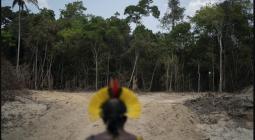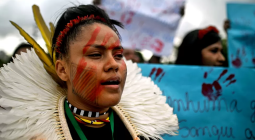Kenya's Ogiek people being evicted for carbon credits - lawyers

Kenya's government is illegally evicting hunter-gatherers from their ancestral lands to profit from carbon offsetting schemes, human rights lawyers say.
Hundreds of members of the Ogiek community are being evicted from the Mau Forest, say their representatives.
Ogiek leader Daniel Kobei said armed forest rangers were "pulling down the houses with axes and hammers".
Kenya's government says such operations are to protect the environment.
Dr Justin Kenrick from the Forest People's Programme said that carbon credits and offsetting were "key" to what was happening.
The developing global carbon credit market allows a polluter to emit carbon dioxide or other climate-heating gas and pay a forest owner to capture those emissions through the carbon-absorption power of their trees.
Dr Kenrick argues that by evicting the Ogiek, Kenya's government is trying to cement its full territorial - and financial - control over an increasingly lucrative asset.
"Those in control of Africa's forests stand to earn a lot of money," he said.
"The Mau is Kenya's biggest forest and in our view it's clear that the interest shown by offsetting companies is prompting the Kenyan Government to assert its control.
"The Ogiek are on the front line of a false climate solution that is used to justify ongoing evictions and emissions."
Lucy Claridge, director of the International Lawyers Project, agreed: "We have strong suspicions that this is related to carbon credits."
Ms Claridge, who has advised the Ogiek since 2010, pointed to recent negotiations between the Kenyan government and a young Dubai-based offsetting firm Blue Carbon, along with the government's announcement of increased funding to conserve forests.
While not accusing the company of any wrongdoing, Ms Claridge said: "Conservation of these lands should be undertaken by the communities who ancestrally own them and who know how to do so."
Many scientists say that the natural world fares better under land held or managed by indigenous communities.
In October, Blue Carbon publicly hailed the signing of a "momentous agreement" with Kenya's State Department of Environment and Climate Change for "the origination of carbon credits for millions of hectares of project area".
However, when the BBC approached the Dubai-based company for a statement regarding the state's evictions in the Mau Forest area of Sasimwani, the company said it did "not have any ongoing projects in Kenya".
Blue Carbon referred to Article 6 of the Paris climate agreement, saying a process was "not eligible" if indigenous communities or vulnerable groups would be displaced.
 IMAGE SOURCE,OPDP
IMAGE SOURCE,OPDP
Elisabeth Ngoliso says she has nowhere else to go
Elisabeth Nguliso told representatives of the Ogiek Peoples Development Programme (OPDP) that she woke to find rangers pulling down homes.
"We tried to ask for time to remove our property from the houses. They refused - we do not know where to go.
"We ask the Kenyan government to remember us, to give us back our lands, this will also help them conserve the other areas. If you tell me to leave, I do not know where I will go."
In a statement, Kenya's Ministry of Environment, Climate Change and Forestry said it was "fully aware" of the operation to reclaim parts of the Mau Forest from "encroachment and illegal logging activities." It urged the "multi-agency security teams" to "carry out the operation humanely."
In October, President William Ruto announced that to "drive Kenya's climate change action", forest rangers would be given better equipment and improved training to tackle the "wanton destruction of forests".
"Our lives and livelihoods depend on the protection and sustenance of our biodiversity and the mitigation of climate change," he said.
In 2017 the Ogiek won a landmark case against government plans to evict them from their ancestral land in the Mau Forest. The African Court of Human and People's Rights ruled they were entitled to live on the land, and the government had violated their rights by trying to evict them.
Last year the court ordered the Kenyan government to pay the forest community reparations for the suffering caused by forced evictions. It also ordered the government to consult the Ogiek in respect of any projects on its land.
However, according to OPDP director Mr Kobei, the evictions, which began on 2 November and are still going on, started without warning. So far around 700 people, half women and children, have been affected.
Mr Kobei described this part of the Mau Forest as a very strong conservation area. "This is the only area where we have pure Ogiek without assimilation," he said. "This is the area where we thought we could say you find true Ogiek."
Photo: OPDP - Ogiek homes in Kenya's Mau Forest have been set on fire





